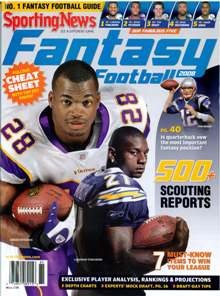‘Silly Little Game’ Interviewed, Ignored Fantasy Forefathers
Tuesday, July 27th, 2010
As August quickly approaches and NFL teams arrive at training camp in rapid succession, the fantasy industry moves closer to its annual fever pitch.
No matter which fantasy sport you might prefer or target with your website, football is the indisputable king. About two-thirds of fantasy players enter the market via football, and about 90 percent of fantasy players surveyed by Dr. Kim Beason last year play football.
As we all get ready for our fantasy drafts, though, it’s worth taking a little time out to look at how we got to this point - where fantasy came from and how it became such a phenomenon.
It’s such a worthwhile sports topic, in fact, that the germination of fantasy sports served as the subject for one of ESPN’s 30 for 30 documentaries back in April. Unfortunately, the film’s creators came up well short in telling the real background story on fantasy sports, as we pointed out on this site after viewing the product.
We bring it back up now, though, because the fact is that the creators didn’t simply miss part of the story, they ignored the part that made a lie of the movie broadcast by The Worldwide Leader.
It would be a bit more understandable if Lucas Jensen and Adam Kurland simply failed to realize the history of fantasy before Daniel Okrent and La Rotisserie. After all, the homepage for “Silly Little Game” reads: “For all this success, the story of the game’s inception is little known. The modern fantasy leagues can be traced back to a group of writers and academics who met at La Rotisserie Francaise in New York City to form a baseball league of their own: The Rotisserie League.”
The real story of fantasy’s birth — the one that begins in the early 1960s with a group of sports lovers and professionals from Oakland, Calif. — already lives on the Web. It would have taken nothing more than a little Googling if Kurland and Jensen didn’t know about Bill Winkenbach. The thing is, they did know.
During the months of researching and filming “Silly Little Game,” Jensen actually took a crew out to Oakland and interviewed Andy Mousalimas, a manager of one of the GOPPPL’s original eight teams, as well as some of his fellow players from the Kings X leagues that began in the late ’60s.
“The film crew not only talked to me, but they filmed and interviewed four Kings X Fantasy Football charter members, including me,” Mousalimas told FSB.com recently. “Later the film crew joined us at the Grand Oaks Restaurant where we held the 42nd Kings Draft; 2009 was my 47th year of F.F. draft. The owner of the restaurant — albeit not a sports fan — was kind to spruce up his banquet room for the draft and the filming.”
Of course, for whatever reason, none of that footage made it into the documentary, nor did any mention of the West Coast games that got this whole phenomenon started. We’ll try to find out from the folks involved why they chose to ignore the history they’d learned, but the key point is that they did.
As we’ve said here before, Okrent and his leaguemates deserve credit for helping to publicize fantasy baseball, a big step toward delivering the pastime to the masses that now play it. At the same time, if you want to feel sorry for someone for not cashing in on the fantasy boom, start at the beginning.
We’re not looking to breed sympathy here, though, we’re just looking to tell the real story. That’s what we’ll be doing at FantasySportsBusiness.com over the next few weeks leading up to the NFL season. We’ll look back to the real beginning of fantasy sports and attempt to give credit to the pioneers of the games that launched our industry.
If you have any information, people or anecdotes that you want to make sure we don’t leave out, please feel free to let us know.
 A recent headline from the Washington Post website seems
A recent headline from the Washington Post website seems 
